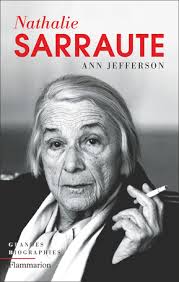Toril Moi at the LRB:
 When I mentioned to a friend that I was going to review a biography of Nathalie Sarraute, his first question was: ‘Will she last?’ I hesitated to reply. First of all, it’s not clear what it means for a writer to ‘last’. Do we mean that she wrote books that will be read for pleasure for centuries, like Pride and Prejudice and Anna Karenina? Sarraute was too avant-garde – too highbrow – to compete with Austen in the popularity stakes. But if ‘Will she last?’ means ‘Will she always have a place in literary history?’ the answer is surely yes. From the 1960s until some time in the 1990s, students and academics read Sarraute (1900-99) as a standard-bearer for the so-called ‘new novel’ alongside Alain Robbe-Grillet (1922-2008), Michel Butor (1926-2016) and Claude Simon (1913-2005). I am not sure that many people read any of them for pleasure these days. (In my more cynical moments, I don’t think anyone read them with much pleasure back then either.) We took for granted that the ‘new novel’ was crucially important, not least because it shared significant preoccupations with a new generation of theorists, including Roland Barthes, Jacques Lacan, Jacques Derrida and Michel Foucault. Both the new novelists and the new theorists detested Balzacian realism and psychological character studies, and embraced a formalist view of language, embedded in an anti-humanist view of subjectivity.
When I mentioned to a friend that I was going to review a biography of Nathalie Sarraute, his first question was: ‘Will she last?’ I hesitated to reply. First of all, it’s not clear what it means for a writer to ‘last’. Do we mean that she wrote books that will be read for pleasure for centuries, like Pride and Prejudice and Anna Karenina? Sarraute was too avant-garde – too highbrow – to compete with Austen in the popularity stakes. But if ‘Will she last?’ means ‘Will she always have a place in literary history?’ the answer is surely yes. From the 1960s until some time in the 1990s, students and academics read Sarraute (1900-99) as a standard-bearer for the so-called ‘new novel’ alongside Alain Robbe-Grillet (1922-2008), Michel Butor (1926-2016) and Claude Simon (1913-2005). I am not sure that many people read any of them for pleasure these days. (In my more cynical moments, I don’t think anyone read them with much pleasure back then either.) We took for granted that the ‘new novel’ was crucially important, not least because it shared significant preoccupations with a new generation of theorists, including Roland Barthes, Jacques Lacan, Jacques Derrida and Michel Foucault. Both the new novelists and the new theorists detested Balzacian realism and psychological character studies, and embraced a formalist view of language, embedded in an anti-humanist view of subjectivity.more here.
